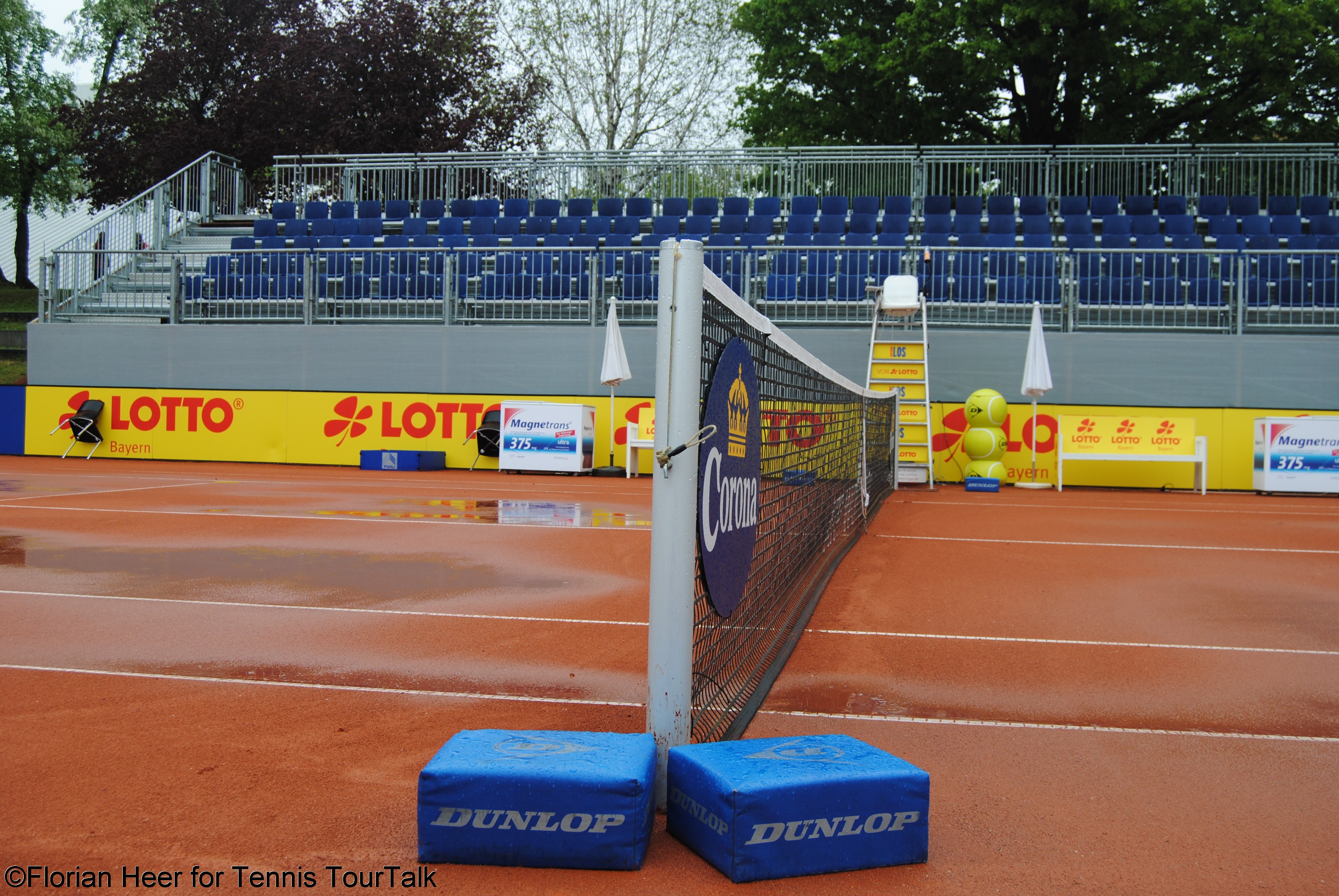Guest Post, September 11, 2024
Rain delays disrupt tennis matches in various ways, impacting players’ rhythm, mental and physical states, schedule, and strategies.
Impact On Playing Conditions And Strategy
Rain significantly alters tennis playing conditions. Courts react differently to moisture, affecting a player’s ability to perform. For example, clay courts remain relatively safe in light rain but become slippery hazards with more precipitation. Grass courts quickly become treacherous even with minimal rain, increasing the risk of injury. Hard courts manage more water but present dangers if poorly drained or sloped.
Tennis balls absorb moisture, becoming heavier and slightly expanded. The added weight and reduced bounce affect serve speed and shot accuracy. The ball’s sluggish behavior, compounded by colder air cooling the ball’s internal gas, forces players to adjust their strategies. These adjustments were evident during the 2024 French Open, where wet balls led to slower, less dynamic gameplay.
Wet conditions increase the risk of slipping, curbing player movement. Players must tread carefully, avoid rapid directional changes, and reduce their running speed. These necessary adjustments can change the match’s dynamic, giving strategic advantages to the more adaptable player.
Scheduling And Mental Impact
Rain delays compress playing schedules, resulting in packed match days without sufficient rest. This challenge was particularly pronounced during the 2024 French Open, where rain caused numerous delays, leading to rescheduled and postponed matches. Players found themselves grappling with frustration and anxiety amid compressed timelines.
Tennis matches interrupted by rain force players to maintain mental sharpness. The uncertainty of when play will resume is mentally taxing, as players must remain in a state of readiness. Continuous mental preparation becomes challenging, as players must find ways to stay focused despite the breaks.
Effect on Sports Betting
Weather-induced delays can change the dynamics of sports betting. Bettors consider factors like rain delays, which can disrupt a player’s momentum, affecting betting odds and potential outcomes. Elements such as these underscore the importance of a nuanced betting approach. For those looking to place wagers, understanding the role of sports betting bonuses can be beneficial, adding complexity to betting decisions in uncertain conditions.
Physical Effects And Player Adaptation
Rain delays physically impact players in many ways. Interruptions can cool down their bodies, leading to stiffness and a heightened risk of injury when play resumes. Players’ muscles need to stay warm, and frequent starts and stops hinder this need. The physical toll posed by these disruptions became evident during the 2001 Wimbledon semifinal between Tim Henman and Goran Ivanisevic, where rain delays impacted match continuity and player performance.
Players often have to play multiple matches in a day or on consecutive days due to compressed schedules caused by rain. This can lead to increased fatigue and physical strain. Players must employ effective warm-up routines to mitigate the risk of fast-paced transitions back onto the court.
Rain delays also allow players and coaches to re-evaluate strategies. Longer delays enable in-depth analysis of the opponent’s weaknesses and adjustments in tactics. Such reassessments can significantly affect match outcomes, particularly around crucial match points.
Psychological Resilience And Venue-Specific Effects
A player’s ability to cope with rain delays hinges on psychological resilience. The mental toll of unpredictable delays can be considerable. Players might engage in varied activities to maintain focus, including interactions with their team or mental exercises. This constant need to stay mentally sharp during breaks adds a complex dimension to their performance.
Venues equipped with retractable roofs, like Court Philippe Chatrier and Court Suzanne Lenglen at the French Open mitigate the impact of rain. However, indoor conditions alter the game environment through differences in air circulation and humidity, potentially giving an edge to players adept at both indoor and outdoor play.
Rain also impacts player experience in terms of attendance and viewership. Notable was a decline in Wimbledon 2024’s attendance due to early-week rain disruptions.
Historical Context And Financial Implications
Rain delays have reappeared across tennis history, disrupting matches and schedules. For instance, the 1922 Wimbledon final was prolonged by a week due to persistent rain. Modern examples, such as the 2024 French Open, saw matches significantly affected by weather.
The financial implications of rain delays can be extensive, particularly for tournaments reliant on ticket sales and broadcasting revenue. Unexpected delays can reduce attendance and viewership, leading to financial losses. From a logistical perspective, managing rain-induced disruptions demands coordination in rescheduling matches and maintaining court conditions, posing challenges for tournament organizers.
Player Perspectives And Long-Term Effects
Players often convey their frustrations with rain delays. The unpredictability imposes mental and physical strains, as seen at the 2024 French Open. Some players prefer courts with roofs to maintain consistency in playing conditions, although not all players agree due to changes in game dynamics under a roof.
Repeated rain delays lead to compressed schedules, affecting players’ recovery time and overall performance. The demands of back-to-back matches can influence long-term player health, increasing injury risks and fatigue levels.
Mitigation Strategies
Preparation for rain delays requires efficient planning by both players and tournament organizers. Contingency plans include match schedule adjustments and using indoor facilities when possible. Ensuring player safety remains paramount.
Players are advised to stay hydrated, eat appropriately, and rest when possible amidst delays. Employing pre-cooling strategies before matches and focusing on post-match recovery are critical to mitigating the physical and mental strains caused by interrupted play.







